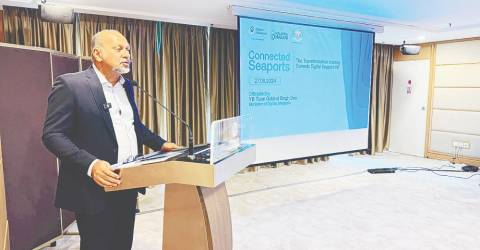kuala lumpur: The government will continue to push for the adoption of 5G and other advanced digital technologies to improve the country’s ports and strengthen Malaysia’s position in the global shipping industry.
Digital Minister Gobind Singh Deo said the initiative was part of a strategy to make Malaysian ports more competitive and efficient globally.
“At the opening ceremony of Malaysia Maritime Week 2024 last month, our Prime Minister Anwar Ibrahim called on the maritime industry to become more resilient and spoke of his ambition to position Malaysia’s ports as one of the top 10 in the world,” Govind said today at the Connected Seaports Forum & Executive Roundtable themed ‘Transformation Journey Towards Digital Ports 4.0 – Use Cases of Advanced Technologies Leveraging 5G’.
Moreover, he said the new Cybersecurity Law plays an important role in ensuring the security of Malaysia’s ports.
“The new Cybersecurity Act will address the management of cybersecurity threats and incidents related to the National Critical Information Infrastructure (NCII) and NCII Sector Leaders,” he added.
Govind pointed out that in line with international best practices, seaports have been included in the definition of NCII.
“This means that the sector must constantly comply with global cybersecurity standards,” he said.
Govind urged Malaysian port operators to follow the example of major ports in China, Italy and Spain, where the integration of 5G and the Internet of Things has improved operations and reduced costs.
“Solutions powered by 5G connectivity, such as AI-enabled autonomous vehicles, video container inspection, predictive equipment maintenance and drone surveillance, will help Malaysian ports achieve faster processing times, better respond to changes and ultimately stay competitive,” he said.
He pointed out that Port Klang, which includes Northport and Westport, has risen two places to 11th in the ranking of the top 100 ports in the world with the highest container throughput in 2023, according to Lloyd’s List’s 100 Ports 2024 Report.
“I want to congratulate you all on your achievement but at the same time, I urge you to keep on working hard and aim higher,” Govind said.
According to the Malaysian Investment Development Authority, Malaysia’s shipping industry accounts for about 40 percent of the country’s gross domestic product.
“Records show that more than 90 per cent of Malaysia’s exports are transported by sea. An efficient port will also reduce trade costs and make the country’s goods more competitive in the international market,” Govind said.
Given the rapid evolution of the technological world, transformation is needed in the ports and maritime logistics sector, he added.
“We live in an increasingly volatile, complex and ambiguous world. In 2021, the Suez Canal was blocked for six days, causing major disruption to the global shipping industry. Ever Given“A 224,000-tonne container ship that ran aground in the canal,” he said.
Govind pointed to a BBC report which said the blockage had stalled global trade by around $9.6 billion a day.
On the Telekom Malaysia (TM) matter, Govind said TM would not be precluded from appealing Digital National Bhd’s decision to terminate the telco’s share subscription agreement (SSA).
“We cannot stop Telecom’s appeal but DNB’s decision to terminate the SSA stands. They sought an extension of the deadline which was granted but as they were unable to comply within the extended deadline the SSA between them and DNB has been terminated. This is a matter between Telecom and DNB and not a ministry matter,” he said.
TM last week received notice from DNB of the termination of the SSA entered into on December 1, 2023 in respect of DNB’s shares. This came after TM’s request and appeal for an “extension of the long stop date of the conditions” was rejected. As the SSA is a related party transaction, TM has filed another request and appeal for extension, pending shareholder approval at an EGM.



